Table of Contents
Key Use Cases for AI Helpdesk PlatformsImplementation Best PracticesROI Calculation Framework
Key Metrics to Track
Frequently Asked Questions
Choosing the Right AI Helpdesk Platform
Final Verdict
Buyer Overview
The helpdesk market is at a critical inflection point. Traditional ticketing systems that have dominated for decades are now facing disruption from AI-native platforms that fundamentally rethink how customer support should work. The difference isn't just about adding AI features to existing helpdesks. It's about whether AI is bolted on as an afterthought or built into the core architecture from day one.
Here's what's actually happening: Legacy helpdesks like Zendesk and Freshdesk are scrambling to retrofit AI capabilities onto platforms designed in the pre-AI era. The power of AI can’t be fully leveraged in that scenario. Meanwhile, newer platforms like Ayudo are being architected from the ground up with AI agents, AI evaluation systems, intelligent workflow orchestration, and autonomous decision-making as foundational elements, not supplementary features.
This architectural difference has real business impact. According to Ayudo's platform performance data, AI-native helpdesk implementations deliver:
- 42% faster resolution with agent productivity improvements
- 60% better deflection rate for routine inquiries
- 25% lower cost per resolution through intelligent automation
- 24/7 availability without proportional staffing increases
Most organizations are being sold "AI-powered" helpdesks that are really just traditional ticketing systems with basic chatbots and suggestion engines slapped on top. The real challenge is distinguishing between platforms where AI is the core versus platforms where AI is just marketing gloss on decade-old architecture.
Understanding Different Types of AI Helpdesk Solutions
Traditional Helpdesk with AI Add-ons
Established ticketing platforms that have added AI capabilities as supplementary features to their core helpdesk functionality.
Core Capabilities:
- Traditional ticket management and tracking
- Basic AI-powered automation and suggestions
- Established integration ecosystems
- Mature reporting and analytics
Best For: Organizations with existing helpdesk investments wanting to add AI capabilities incrementally
AI-First Helpdesk Platforms
Modern platforms built with AI and automation at their core, offering intelligent workflow management from the ground up.
Core Capabilities:
- AI-native workflow automation
- Intelligent ticket routing and prioritization
- Advanced agent assistance and copilot features
- Predictive analytics and insights
Best For: Companies seeking comprehensive AI-powered customer service automation with modern architecture
CRM-Integrated Service Platforms
Helpdesk solutions deeply integrated with broader CRM platforms, offering unified customer data and cross-functional workflows.
Core Capabilities:
- Unified customer data across sales and service
- Cross-department collaboration tools
- Advanced customer journey tracking
- Integrated marketing and sales handoffs
Best For: Organizations wanting unified customer experience across all touchpoints
Conversational Support Platforms
Helpdesk systems focused on messaging and conversational interfaces with AI-powered chat as the primary channel.
Core Capabilities:
- Messaging-first customer interactions
- Real-time conversation management
- AI-powered chatbots and automation
- Modern, mobile-friendly interfaces
Best For: Businesses prioritizing conversational, real-time customer engagement
Head-to-Head Comparison: Top AI Helpdesk Platforms
(2700+)
(500+)
(1000+)
(650+)
(3000+)
(500+)
Detailed AI Helpdesk Platform Analysis
Ayudo - Agentic AI Helpdesk Platform
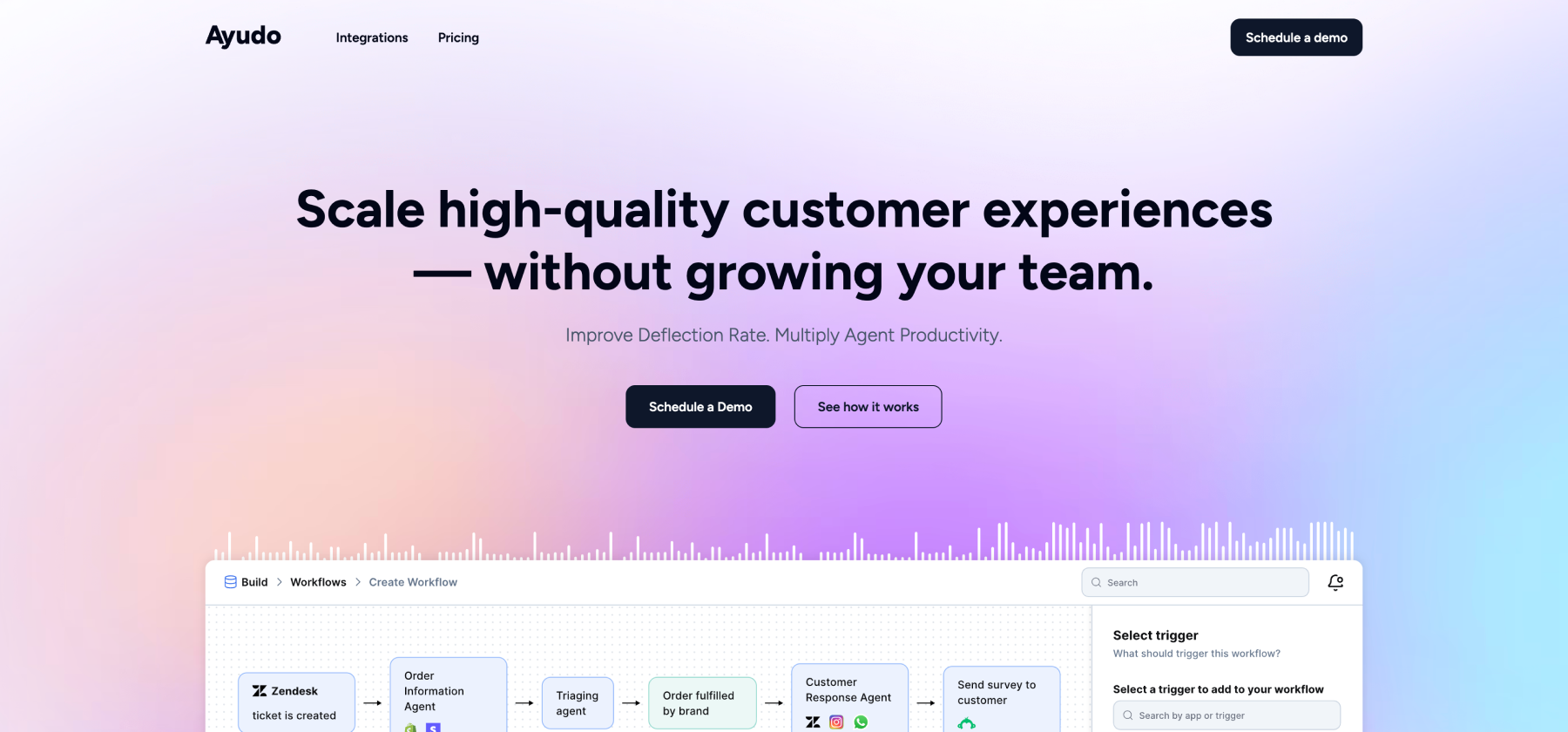
Best for: Companies wanting comprehensive AI-powered automation with rapid deployment. Mid-market to enterprise companies seeking modern, AI-first helpdesk capabilities with minimal setup time and maximum automation potential.
Strengths:
- Launch trained AI workflows in under 60 minutes
- AI based ticket escalation to L1 and L2 teams.
- Advanced multi-AI agent collaboration for complex ticket resolution
- Extensive integration ecosystem (2700+ apps)
- Real-time knowledge base synchronization
- Specialized voice and text AI agents
- Proactive agent copilot with intelligent suggestions
- Enterprise-ready security and compliance from day one
- Seamless omnichannel support
Considerations:
- Newer platform with growing ecosystem
- May require adjustment for teams used to traditional helpdesk interfaces
- Medium pricing point
Zoho Desk - Comprehensive Suite Solution
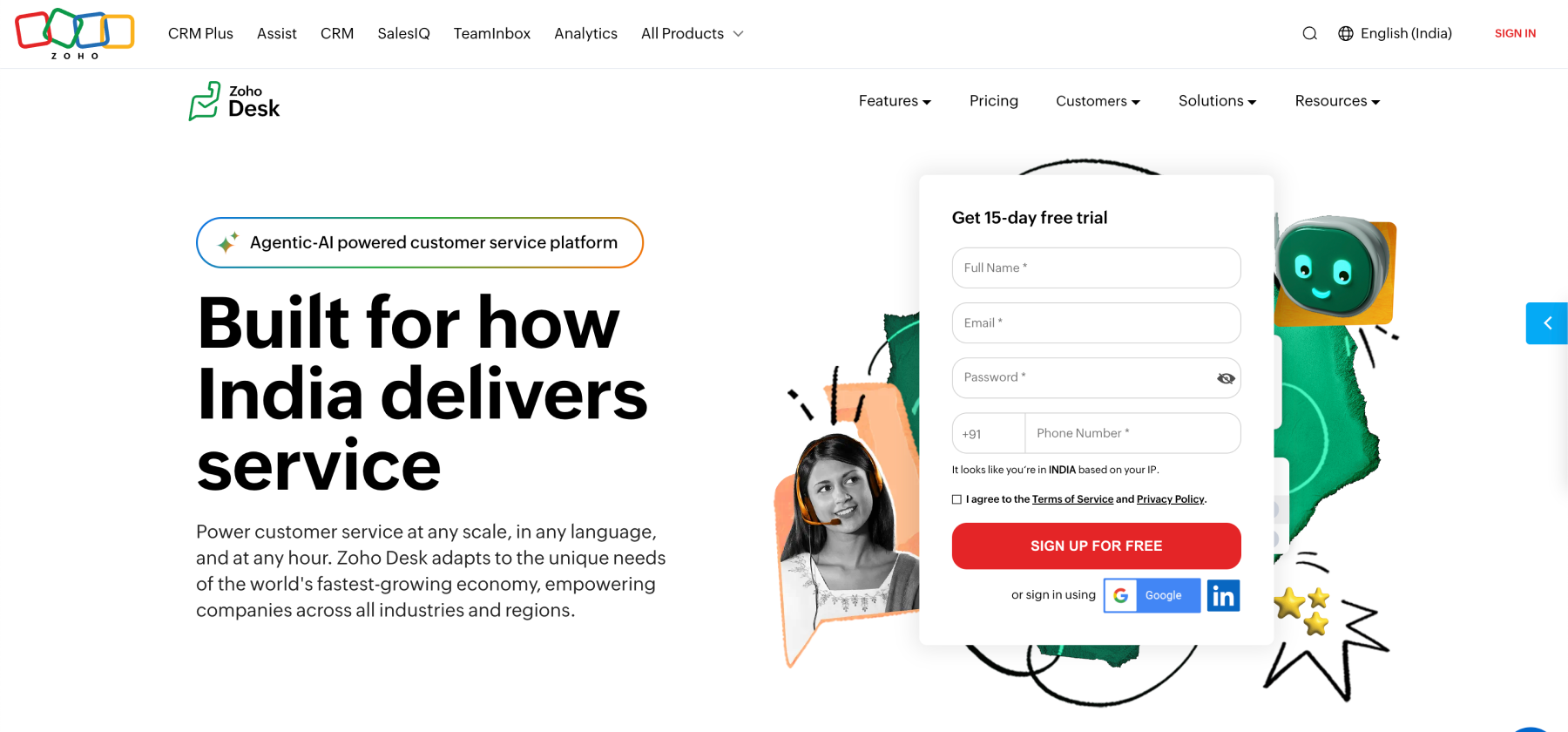
Best for: Small to medium businesses already using or willing to adopt Zoho's broader suite of business tools.
Strengths:
- Very competitive pricing for small businesses
- Good integration with Zoho suite (CRM, Projects, Analytics)
- Solid automation and workflow capabilities
- Context-aware AI assistant (Zia)
- Multi-channel ticket management
- Good self-service portal features
Limitations:
- AI features less advanced than specialized platforms
- Best value requires Zoho ecosystem commitment
- Limited advanced workflow automation
- Interface can feel dated compared to modern platforms
- Integration complexity outside Zoho ecosystem
Zendesk - Enterprise Helpdesk Leader
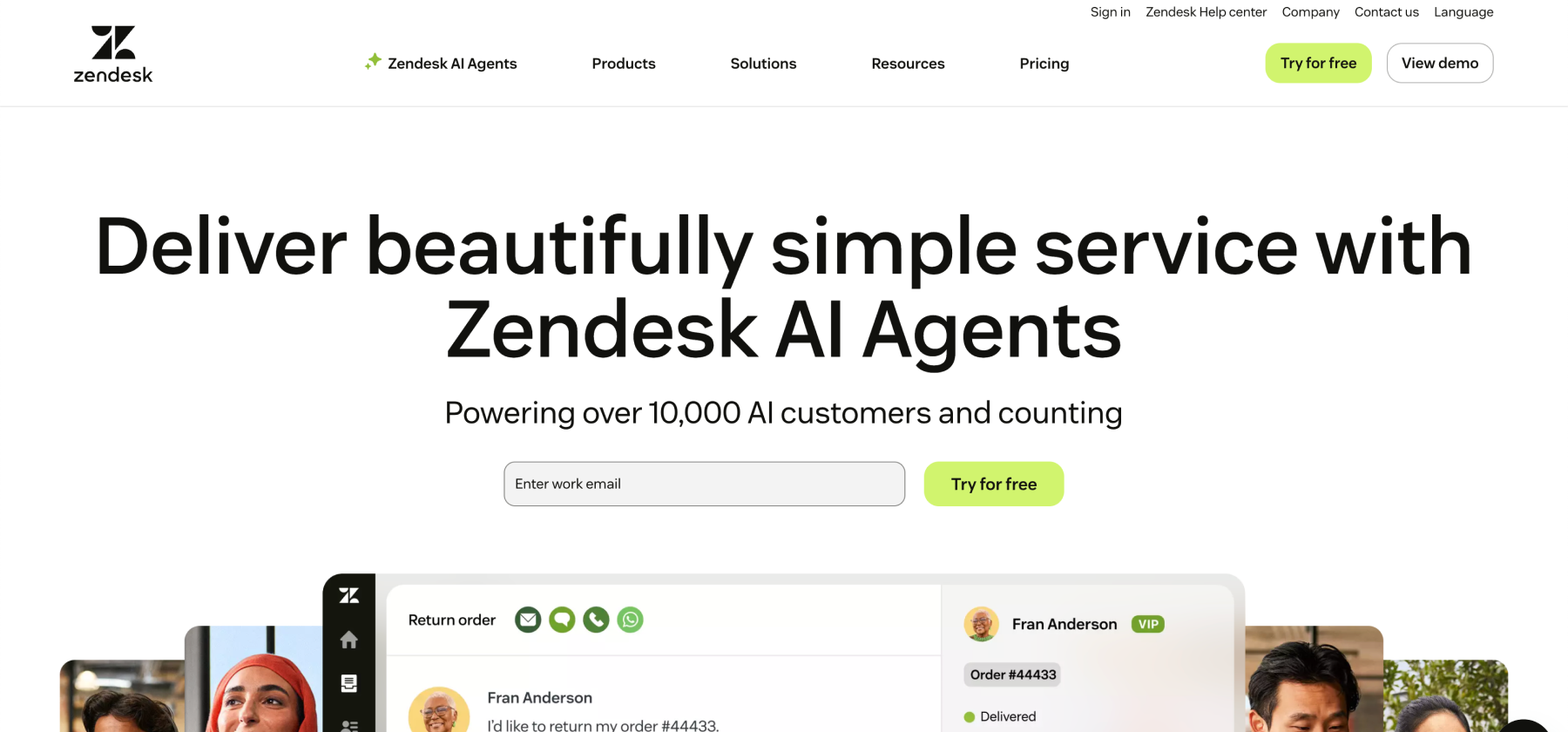
Best for: Large enterprises with dedicated support teams, complex multi-brand requirements, and budget for premium solutions
Strengths:
- Mature, feature-rich platform with extensive capabilities
- Large marketplace with 1000+ integrations and apps
- Advanced reporting and analytics
- Strong multi-brand and multi-language support
- Comprehensive knowledge base and community features
- Enterprise-grade security and compliance
- Extensive customization options
Limitations:
- Complex setup and configuration process
- AI features feel supplementary rather than core
- Expensive, especially as you scale features and agents
- Steep learning curve for new users
- Can feel over-engineered for simpler use cases
- Long implementation timelines (weeks to months)
Freshdesk - User-Friendly Helpdesk
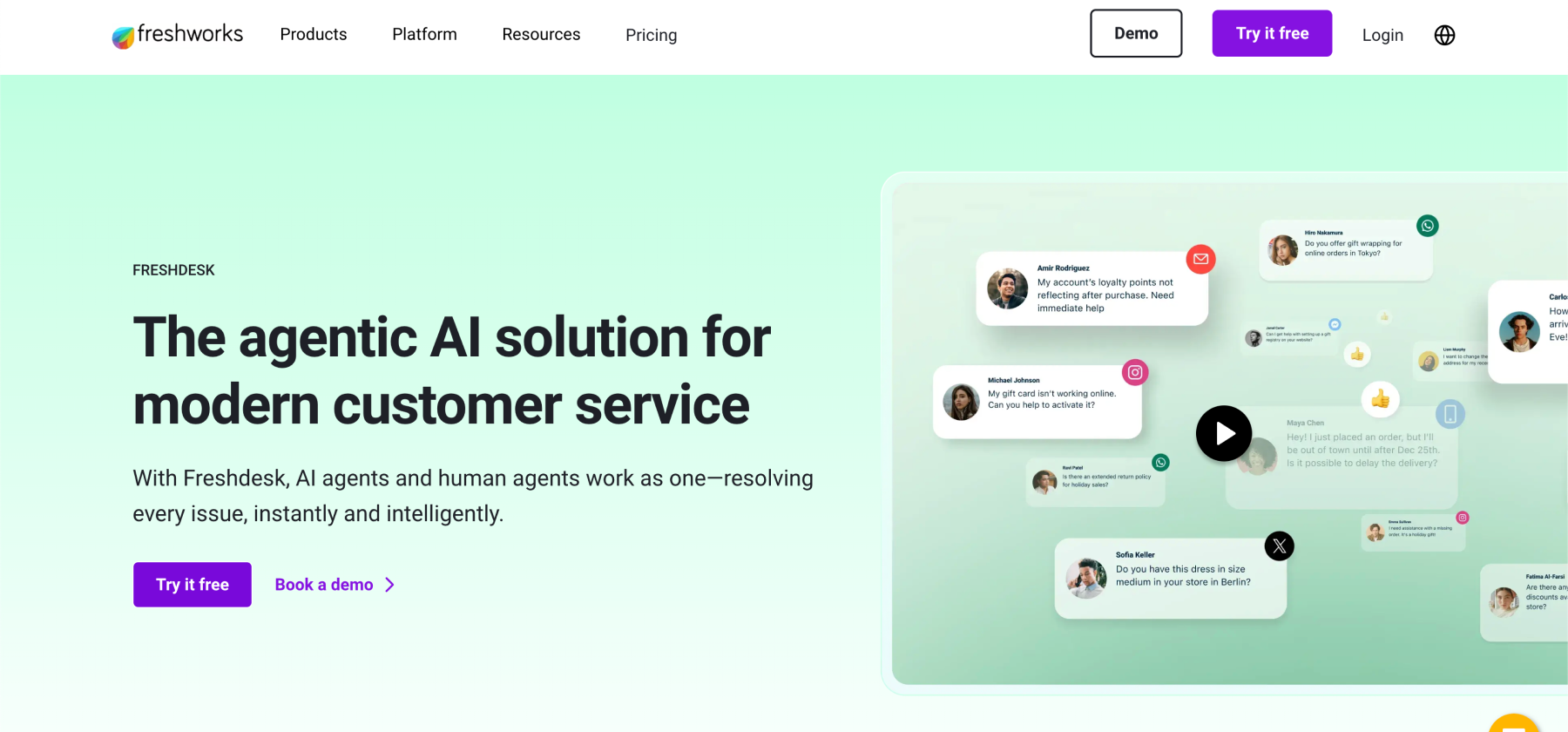
Best for: Growing businesses seeking balance between features and ease of use
Strengths:
- Intuitive, user-friendly interface
- Good balance of features and affordability
- Freddy AI for basic automation and insights
- Solid multi-channel support
- Good integration with Freshworks suite
- Reasonable pricing tiers for scaling
- Quick deployment and onboarding
Limitations:
- AI capabilities less sophisticated and superficial than specialized platforms
- Advanced features require higher pricing tiers
- Limited workflow automation for complex scenarios
- Best value comes with Freshworks ecosystem commitment
- Reporting less robust than enterprise platforms
Salesforce Service Cloud - Enterprise CRM Service
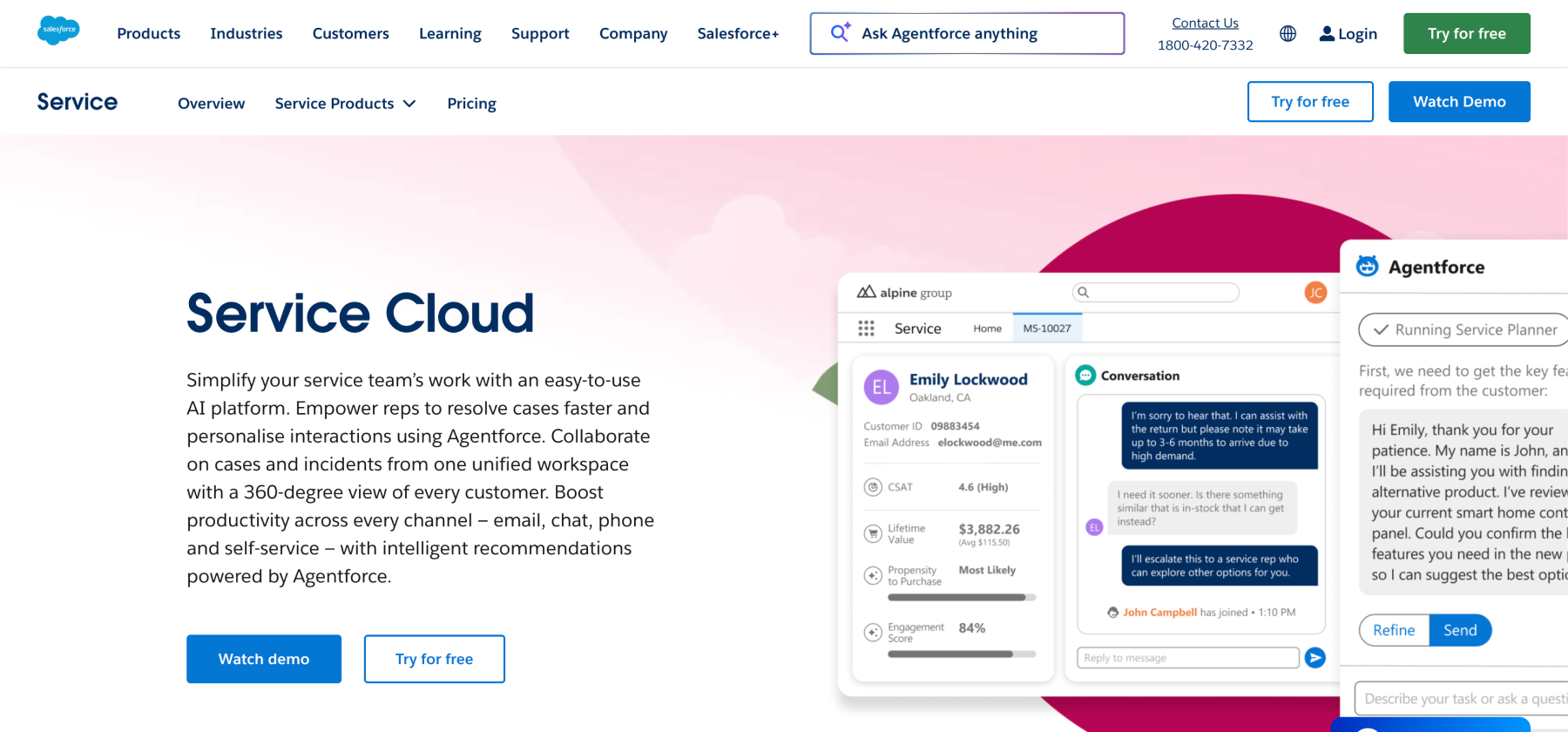
Best for: Large enterprises already invested in Salesforce ecosystem with complex service needs and dedicated Salesforce resources
Strengths:
- Deep integration with Salesforce CRM ecosystem
- Einstein AI for advanced automation and predictions
- Comprehensive 360-degree customer view
- Extremely powerful customization through Salesforce platform
- Advanced case management and workflow automation
- Strong enterprise features and security
- Extensive integration marketplace (3000+ apps)
Limitations:
- Very expensive with complex pricing structure
- Requires significant Salesforce expertise and resources
- Long, complex implementation (often months) which comes with a hefty price from an implementation partner.
- Steep learning curve for users and administrators
- Can be over-engineered for companies not using broader Salesforce ecosystem
- AI features often require additional licensing
HubSpot Service Hub - CRM-Integrated Support
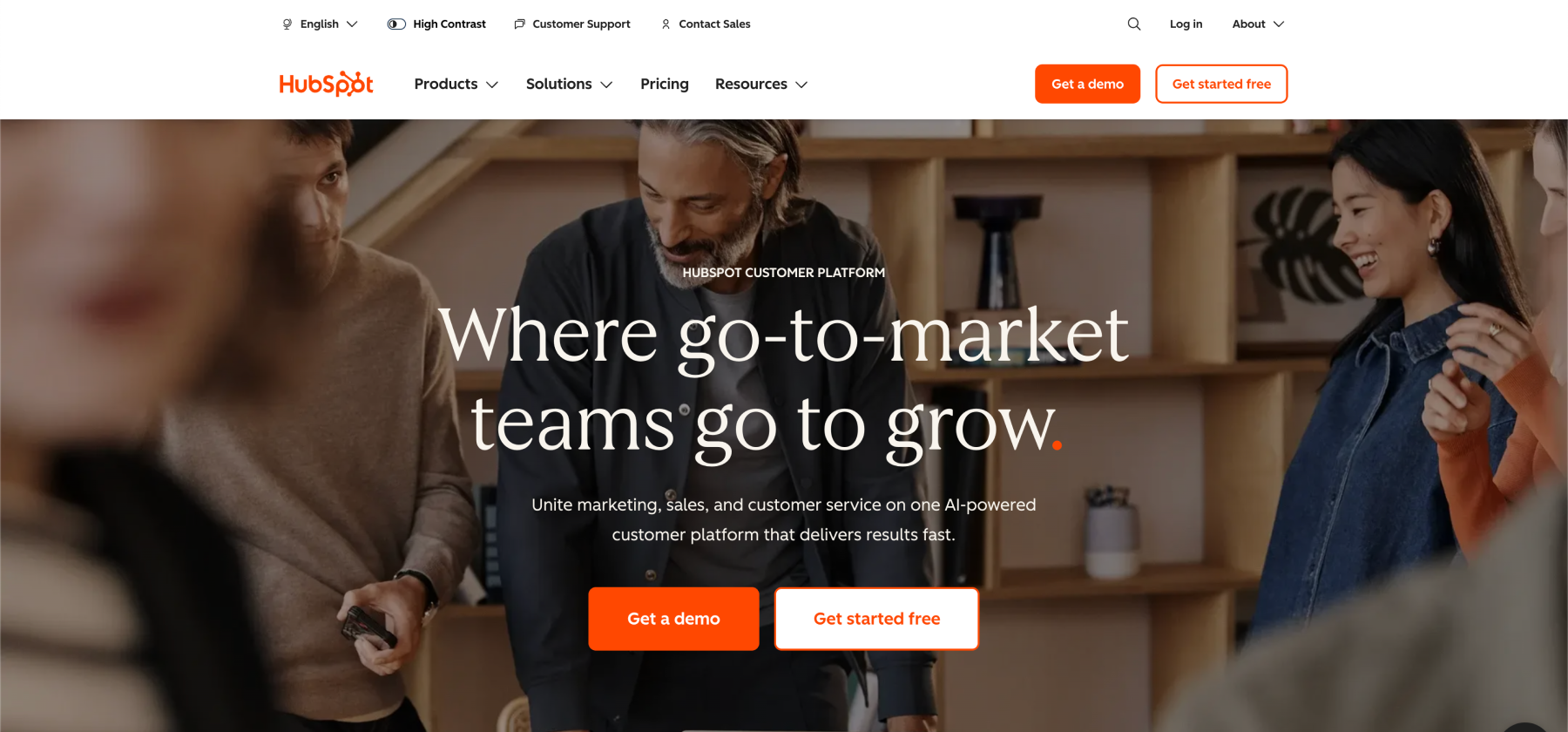
Best for: Companies using HubSpot CRM wanting integrated customer service capabilities
Strengths:
- Seamless integration with HubSpot CRM and Marketing Hub
- Unified customer data across sales, marketing, and service
- User-friendly interface consistent with HubSpot ecosystem
- Good ticketing and conversation management
- Solid knowledge base and self-service features
- Reasonable pricing for mid-market companies
- Growing AI capabilities and automation
Limitations:
- AI features less advanced than specialized platforms
- Limited standalone value outside HubSpot ecosystem
- Fewer advanced helpdesk features compared to dedicated platforms
- Integration ecosystem smaller than enterprise competitors
- Advanced features require higher-tier subscriptions
Intercom - Conversational Support Platform
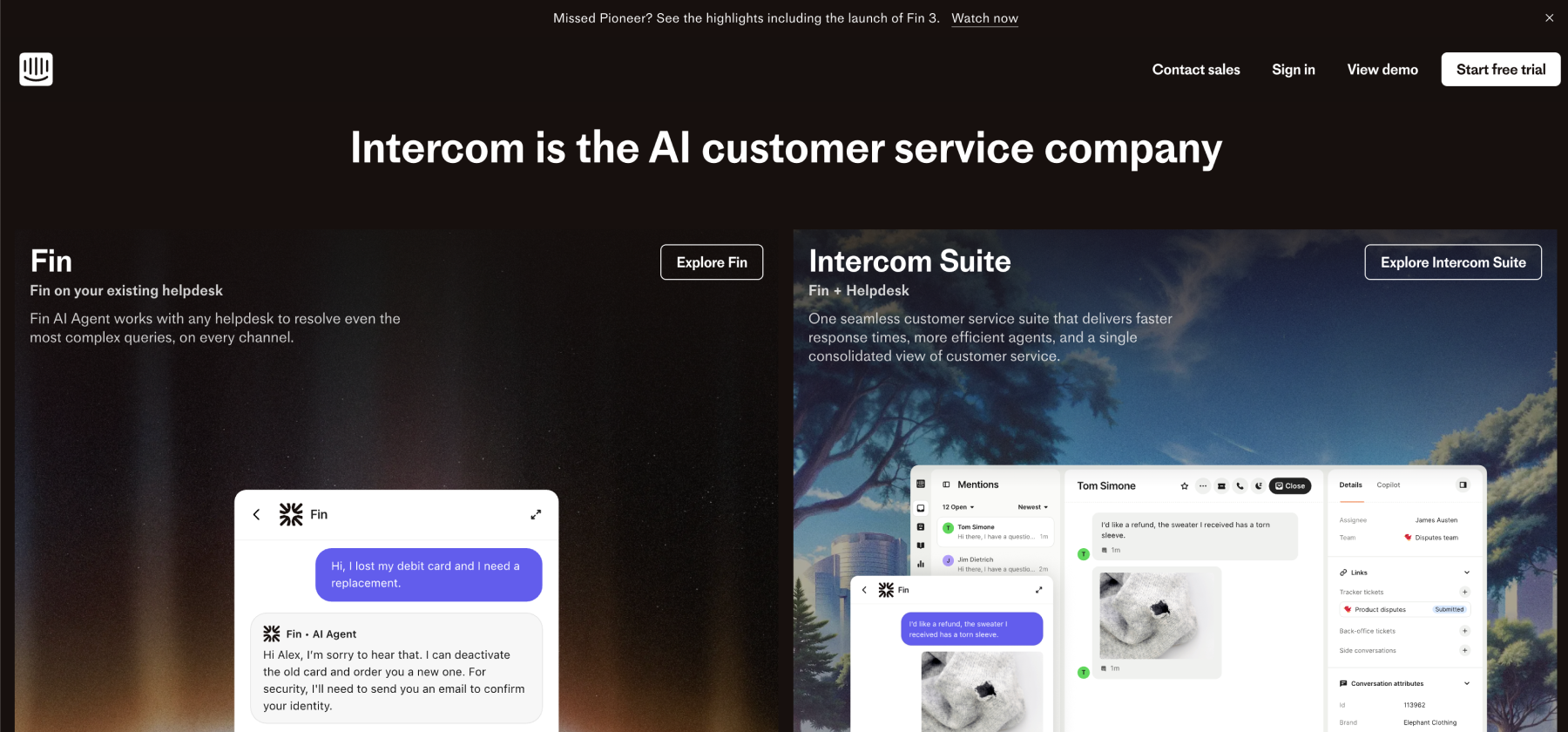
Best for: Most often only preferred by product-led growth companies and SaaS businesses prioritizing in-app messaging and real-time conversational support.
Strengths:
- Modern, messaging-first interface
- Strong conversational AI capabilities (Fin AI)
- Excellent real-time customer engagement
- Good product tours and in-app messaging
- Mobile-first user experience
- Strong for proactive customer communication
- Advanced conversation routing and assignment
Limitations:
- Traditional ticketing features less robust than dedicated helpdesks
- Expensive as you scale users and features
- Limited workflow automation for complex scenarios
- Reporting less comprehensive than enterprise platforms
- Voice support capabilities limited
- Can be costly for companies needing traditional helpdesk features
Key Use Cases for AI Helpdesk Platforms
Omnichannel Ticket Management
Goal: Centralize and manage customer inquiries across all channels with intelligent routing and automation
Best Platforms: Ayudo, Zendesk, Salesforce Service Cloud
Key Features Needed:
- Multi-channel inbox (email, chat, social, voice, SMS)
- Intelligent ticket routing and assignment
- Context preservation across channels
- Unified customer conversation history
- SLA management and tracking
Success Metrics:
- Reduced average response time
- Improved first contact resolution rates
- Higher customer satisfaction scores
- More efficient agent workload distribution
- Better SLA compliance rates
Agent Productivity Enhancement
Goal: Empower support agents with AI assistance, automated workflows, and intelligent suggestions
Best Platforms: Ayudo, Salesforce Service Cloud, Zendesk
Key Features Needed:
- Real-time agent copilot and proactive suggestions
- Automated response recommendations
- Smart knowledge base search
- Sentiment analysis and priority detection
- Performance analytics and coaching insights
Success Metrics:
- Faster resolution times (Ayudo reports 42% improvement)
- Increased tickets handled per agent
- Reduced agent training and onboarding time
- Improved agent satisfaction and retention
- Lower cost per resolution (Ayudo reports 25% reduction)
Self-Service and Deflection
Goal: Enable customers to find answers independently while reducing ticket volume
Best Platforms: Ayudo, Zendesk, Freshdesk
Key Features Needed:
- AI-powered knowledge base with smart search
- Automated chatbots and virtual agents
- Voice Agents
- Community forums and peer support
- Interactive troubleshooting guides
- Customer portal with order tracking
Success Metrics:
- Improved deflection rates (Ayudo reports over 60% improvement)
- Reduced ticket volume for routine inquiries
- Higher customer self-service usage
- Improved knowledge base engagement
- Maintained or improved customer satisfaction
Complex Workflow Automation
Goal: Automate multi-step processes and complex escalation scenarios
Best Platforms: Ayudo, Salesforce Service Cloud, Zendesk
Key Features Needed:
- Advanced workflow builder with conditional logic
- Multi-agent collaboration and handoffs (Salesforce and Zendesk do not support this feature)
- Integration with business systems (CRM, ERP, order management)
- Automated escalation procedures
- Custom field and object support
Success Metrics:
- Reduced manual processing time
- Faster resolution for complex issues
- Improved cross-team collaboration
- Higher process compliance rates
- Better visibility into support operations
Enterprise Service Management
Goal: Scale support operations across multiple brands, regions, and product lines
Best Platforms: Salesforce Service Cloud, Zendesk, Ayudo
Key Features Needed:
- Multi-brand and multi-language support
- Role-based access control and permissions
- Advanced security and compliance features
- Customizable SLA and business hours
- Dedicated account management and support
Success Metrics:
- Consistent service quality across brands/regions
- Improved compliance and security posture
- Better resource allocation and planning
- Enhanced reporting and insights
- Successful scaling without proportional cost increases
Implementation Best Practices
Pre-Implementation Planning
Define Success Metrics and KPIs
- Establish baseline measurements for response time, resolution time, and customer satisfaction
- Set realistic improvement targets based on current performance
- Create measurement frameworks for ongoing optimization
- Plan for both quantitative metrics and qualitative feedback
Process Audit and Documentation
- Map existing customer service workflows and processes
- Identify pain points, bottlenecks, and inefficiencies
- Document current ticket volume, categories, and resolution patterns
- Analyze channel usage and customer preferences
Integration Requirements Assessment
- Inventory current tech stack and identify critical integrations
- Assess data migration needs from existing helpdesk system
- Plan for single sign-on (SSO) and security requirements
- Determine API and custom integration needs
Team Preparation and Training
- Identify key stakeholders and champions for the implementation
- Plan comprehensive training program for agents and administrators
- Communicate change management plan to entire support team
- Prepare documentation and resources for ongoing learning
Deployment Strategy
Phase 1: Foundation Setup (Week 1-2)
- Configure basic ticket routing and workflow automation
- Set up core integrations with existing systems (CRM, knowledge base)
- Import historical data and customer information
- Establish escalation procedures and SLA policies
- Train AI models with historical ticket data
Phase 2: Pilot Testing (Week 3-4)
- Deploy to small group of agents (10-20% of team)
- Monitor performance closely and gather feedback
- Identify gaps and areas for optimization
- Refine workflows based on real usage patterns
- Test escalation procedures and edge cases
Phase 3: Full Rollout (Week 5-6)
- Expand to entire support team
- Implement advanced automation and AI features
- Enable multi-channel support if not already active
- Launch self-service portal and knowledge base
- Establish ongoing optimization processes
Phase 4: Optimization and Scaling (Ongoing)
- Continuously refine AI models and automation rules
- Expand integration ecosystem as needed
- Add advanced features and capabilities incrementally
- Monitor metrics and adjust based on performance data
- Scale resources based on growth and seasonal patterns
Best Practices for Ongoing Success
Knowledge Base Management
- Maintain up-to-date, accurate documentation
- Use consistent formatting and terminology
- Implement version control and approval workflows
- Create feedback loops for continuous improvement
- Regularly review and update based on ticket trends
Workflow Optimization
- Start with simple automation and add complexity gradually
- Design clear escalation paths and exception handling
- Monitor automation performance and adjust rules
- Test changes in sandbox before production deployment
- Document all custom workflows and configurations
Agent Training and Development
- Provide comprehensive onboarding for new agents
- Offer ongoing training on new features and capabilities
- Share best practices and success stories across team
- Use performance analytics for targeted coaching
- Encourage feedback and suggestions from frontline agents
ROI Calculation Framework
Cost Savings Analysis
Formula: Annual Savings = (Current Support Costs × Deflection Rate) - Platform Costs
Key Metrics to Track
Efficiency Metrics
- Resolution Time: Track reduction in average and median resolution times (Ayudo reports 42% improvement)
- First Contact Resolution: Measure percentage of issues resolved in first interaction
- Deflection Rate: Monitor self-service success and ticket volume reduction (Ayudo reports over 60% improvement)
- Cost Per Ticket: Calculate total support costs divided by ticket volume (Ayudo reports 25% reduction)
Quality Metrics
- Customer Satisfaction (CSAT): Track post-interaction satisfaction scores
- Net Promoter Score (NPS): Measure overall customer loyalty and advocacy
- Agent Satisfaction: Monitor agent engagement and job satisfaction
- SLA Compliance: Track percentage of tickets meeting SLA requirements
Business Impact Metrics
- Customer Retention: Measure impact on customer churn and retention
- Customer Lifetime Value: Track changes in customer value over time
- Support Team Scalability: Monitor ticket volume growth vs. headcount growth
- Time to Value: Measure how quickly new implementations deliver ROI
Frequently Asked Questions
Implementation & Migration
Implementation time varies significantly by platform complexity and organization size. Modern platforms like Ayudo can have workflows running in under 60 minutes, while Freshdesk typically takes days, and enterprise platforms like Zendesk or Salesforce Service Cloud may require weeks or months for full deployment.
Most modern helpdesk platforms offer data migration tools and services. Critical data to migrate includes customer records, ticket history, knowledge base articles, and team configurations. Work with your vendor's implementation team and plan for thorough testing before full cutover. Ayudoo supports self-serve migration inside the product itself.
Not necessarily. Many AI helpdesk platforms integrate with existing tools like CRM systems, communication platforms, and business applications. Evaluate integration capabilities carefully to ensure smooth workflows across your tech stack.
AI Capabilities & Performance
Results vary based on implementation quality and use case complexity. For reference, Ayudo reports 42% faster resolution times, over 60% better deflection rates, and 25% lower cost per resolution for their customers. Your results will depend on your specific implementation and optimization efforts.
AI accuracy depends on training data quality, use case complexity, and ongoing optimization. Well-implemented AI helpdesks achieve high accuracy for routine inquiries while seamlessly escalating complex issues to human agents. Plan for continuous monitoring and refinement.
AI is designed to augment rather than replace support agents. It handles routine, repetitive tasks while empowering agents to focus on complex, high-value interactions. Most organizations see improved agent satisfaction as AI reduces burnout from monotonous work.
Integration & Customization
Integrations typically include CRM systems, knowledge bases, collaboration and communication platforms, order management systems, and payment processors. Ensure your chosen platform has native connectors for your critical business systems.
Customization capabilities vary significantly by platform. Enterprise platforms like Salesforce Service Cloud offer extensive customization, while others provide pre-built workflows with limited modification. Evaluate customization needs against platform capabilities during selection.
Cost & Pricing
Most helpdesk platforms use per-agent, per-month pricing with tiered feature sets. Additional costs may include implementation, training, premium support, and add-on features. Carefully review total cost of ownership including hidden fees and scaling costs.
Common hidden costs include premium integrations, advanced AI features, additional storage, phone support channels, premium customer support, and professional services for implementation and customization.
Choosing the Right AI Helpdesk Platform
Small Businesses
(Under 50 employees)
Ayudo or Freshdesk
- Quick setup and deployment
- Affordable pricing for small teams
- User-friendly interfaces
- Essential automation features
Growing Companies
(50–200 employees)
Ayudo or Freshdesk
- Scalable as business grows
- Advanced automation without complexity
- Extensive integration options
- Professional support and training
Large Enterprises
(200+ employees)
Ayudo, Zendesk, or Salesforce Service Cloud
- Advanced workflow automation
- Enterprise-grade security and compliance
- Extensive customization capabilities
- Dedicated account management
AI-First Automation
Ayudo
- Advanced multi-agent workflows
- Rapid deployment (under 60 minutes)
- Specialized voice and text AI agents
- Proactive agent copilot
Conversational Support
Ayudo or Intercom
- Modern messaging interface
- Real-time customer engagement
- Strong in-app messaging
- Product-led growth features
Budget-Conscious SMBs
Ayudo, Zoho Desk, or Freshdesk
- Competitive pricing tiers
- Good feature set for the price
- No long-term contracts required
- Free trials available
Complex Enterprise Needs
Ayudo, Salesforce Service Cloud, or Zendesk
- Extensive customization options
- Multi-brand support
- Advanced reporting and analytics
- Proven scalability
- AI based insights and analytics
Final Verdict
The AI helpdesk landscape offers solutions for every business size, complexity level, and budget. Success depends on choosing a platform that aligns with your current needs while providing room for growth, and selecting one that integrates seamlessly with your existing technology ecosystem.
For most businesses, we recommend platforms that offer rapid deployment, strong AI capabilities, and intuitive interfaces. Ayudo stands out as a truly AI-native platform that works seamlessly across all ecosystems, whether you use Salesforce, HubSpot, Zoho, or any combination of tools. With 2700+ integrations, Ayudo doesn't lock you into a specific vendor ecosystem.
In contrast, Zoho Desk, Salesforce Service Cloud, and HubSpot Service Hub deliver their best value and efficiency only when you're fully committed to their respective ecosystems. They work, but they're optimized for their own family of products, which can create integration challenges and additional costs if you use tools outside their ecosystems.
Freshdesk offers solid value for growing businesses prioritizing ease of use, while Zendesk remains a strong choice for large enterprises with complex requirements and the budget to match. Intercom excels for companies focused on conversational, real-time engagement, particularly in product-led growth scenarios.
The key question: Do you want a helpdesk that works with your entire tech stack, or one that works best only within its own walled garden?
Ready to transform your customer support?
Contact our team for a personalized demo and see how the right AI helpdesk can enhance your customer experience while reducing operational costs.
This guide was last updated in 2026. For the most current information on AI helpdesk platforms and implementation strategies, consult with solution providers directly.





